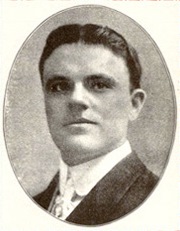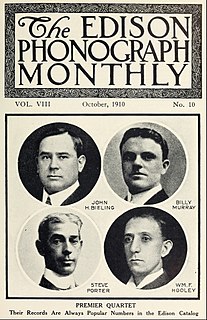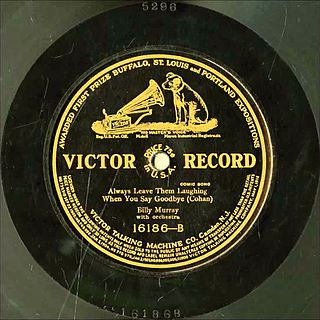The Haydn Quartet, later known as the Hayden Quartet, was one of the most popular recording close harmony quartets in the early twentieth century. It was originally formed in 1896 as the Edison Quartet to record for Edison Records; it took its new name when recording for other companies. The name was a homage to Joseph Haydn, the classical composer; the spelling was later revised to Hayden, which reflects the way it was pronounced. The group disbanded in 1914.

William Thomas Murray was one of the most popular singers in the United States in the early 20th century. While he received star billing in vaudeville, he was best known for his prolific work in the recording studio, making records for almost every record label of the era.

"You're a Grand Old Flag" is an American patriotic march. The song, a spirited march written by George M. Cohan, is a tribute to the U.S. flag. In addition to obvious references to the flag, it incorporates snippets of other popular songs, including one of his own. Cohan wrote it in 1906 for his stage musical George Washington, Jr.
"The Teddy Bears' Picnic" is a song consisting of a melody by American composer John Walter Bratton, written in 1907, and lyrics added by Irish songwriter Jimmy Kennedy in 1932. It remains popular as a children's song, having been recorded by numerous artists over the decades. Kennedy lived at Staplegrove Elm and is buried in Staplegrove Church, Taunton, Somerset, England. Local folklore has it that the small wooded area between the church and Staplegrove Scout Hut was the inspiration for his lyrics.

Ada Jane Jones was an English-American popular singer who made her first recordings in 1893 on Edison cylinders. She is among the earliest female singers to be recorded.
"Hesitation Blues" is a popular song adapted from a traditional tune. One version was published by Billy Smythe, Scott Middleton, and Art Gillham. Another was published by W.C. Handy as "Hesitating Blues". Because the tune is traditional, many artists have taken credit as writer, frequently adapting the lyrics of one of the two published versions. Adaptations of the lyrics vary widely, though typically the refrain is recognizably consistent. The song is a jug band standard and is also played as blues and sometimes as Western swing. It is cataloged as Roud Folk Song Index No. 11765. Composer William Grant Still arranged a version of the song in 1916 while working with Handy.

"School Days" is an American popular song written in 1907 by Will D. Cobb and Gus Edwards. Its subject is of a mature couple looking back sentimentally on their childhood together in primary school. The song was featured in a Broadway show of the same name, the first in a series of Edwards' school acts. It was the inspiration for many subsequent school acts, including the Marx Brothers' Fun in Hi Skule, their first major Vaudeville success.

The American Quartet was a four-member vocal group that recorded for various companies in the United States between 1899 and 1925. The membership varied over the years, but the most famous line-up — comprising John Bieling, Billy Murray, Steve Porter (baritone), and William F. Hooley (bass) — recorded for the Victor Talking Machine Company from 1909 to 1913. The same group of singers also recorded for Edison Records as the Premier Quartet, and for that and other labels as the Premier American Quartet. From 1912 to 1914 the quartet also recorded with countertenor Will Oakland as the Heidelberg Quintet.
"He May Be Old, But He's Got Young Ideas" was a popular song, originally published in 1916. It was written by Howard Johnson, Alex Gerber and Harry Jentes. It was published as sheet music and was recorded by several popular singers. Today, the most famous version is a 1916 version by Billy Murray, whose version has entered the public domain.
"Good Evening, Caroline" is a 1908 popular song, written by Albert Von Tilzer and Jack Norworth. The singer Billy Murray made at least two recordings of the song: one from 1908 on Edison Records, and one in 1909 on Indestructible Record Company. The 1909 recording became one of the most popular recordings of its year. Murray's versions are the most commonly heard today.
"He Goes to Church on Sunday" is a popular song published in 1907 with lyrics by Vincent Bryan and music by E. Ray Goetz. It was first introduced by Eddie Foy in the Broadway production of the musical comedy The Orchid. The song tells the stories of men who defraud people, but are considered honest because they go to church on Sundays. However, the song doesn't appear to be a criticism of religion, and the tone of the song is humorous and light-hearted.
I'm Afraid to Come Home in the Dark is popular song, written by Egbert Van Alstyne and Harry Williams in 1907, and made famous by Billy Murray. Today it is popular among collectors of cylinder recordings. Billy Murray recorded the song on several record labels, including Edison Records in 1908. This version is now in the public domain.
"Any Little Girl, That's a Nice Little Girl, Is the Right Little Girl for Me" is a popular song, first published in 1910, and written by Thomas J. Gray and Fred Fisher. Although largely forgotten today, a 1911 recording of the song by Billy Murray on Zon-O-Phone Records survives, and is widely accessible because the recording has entered the public domain. It was also featured in a Max Fleischer "Follow the Bouncing Ball" sing-a-long animated cartoon in the early 1930s. The song appears on the soundtrack of the 1933 film Stage Mother. Subsequently, in 1938 it was recorded for Bluebird Records by Shep Fields and his orchestra, with the accordionist John Serry Sr.

"Always Leave Them Laughing When You Say Goodbye" was a popular song, first published in 1904, and written by George M. Cohan. Today, the best known recording of the song is by Billy Murray, which was recorded in 1907 with Victor Records, and whose version has entered the public domain. Although very popular in the early 20th century, the song is almost completely forgotten today.
"Because I'm Married Now" was a popular song, first published in 1907, and written by Herbert Ingraham. Singer Billy Murray recorded at least two versions in 1907, one for Edison Records and another for Manhattan Records.

Bon Bon Buddy is a popular song, first published in 1907, with lyrics by Alex Rogers and music by Will Marion Cook. It was introduced in the 1908 musical Bandanna Land. Today the best-known versions of the largely forgotten song are by Billy Murray, who recorded versions in 1908 on both Victor Records and Indestructible Records.
"College Life" is a popular song, first published in 1905 and written by Hery Frantzen. Today the most well-known version is by Billy Murray, who recorded a 1906 version for Victor Records which has entered the public domain.
Dear Sing Sing is a popular song, words by William Jerome, music by Jean Schwartz, first published in 1903. A popular singer of the time named Billy Murray recorded at least two versions in 1904, one for Edison Records and another for Victor Records. Both of these recordings are now public domain, and can be downloaded at several websites.

"Pride Of The Prairie" is a popular song written in 1907 with music by George Botsford and lyrics by Henry J. Breen. The lyrics tell of a cowboy's love for Mary, the "Pride of the Prairie".

I Want to Go Back to Michigan is a song by Irving Berlin composed in 1914. It was a moderate commercial success when it was first released with popular versions by Elida Morris and by Morton Harvey. Afterwards it became a staple in vaudeville. Its most famous performance was by Judy Garland in the film Easter Parade.









